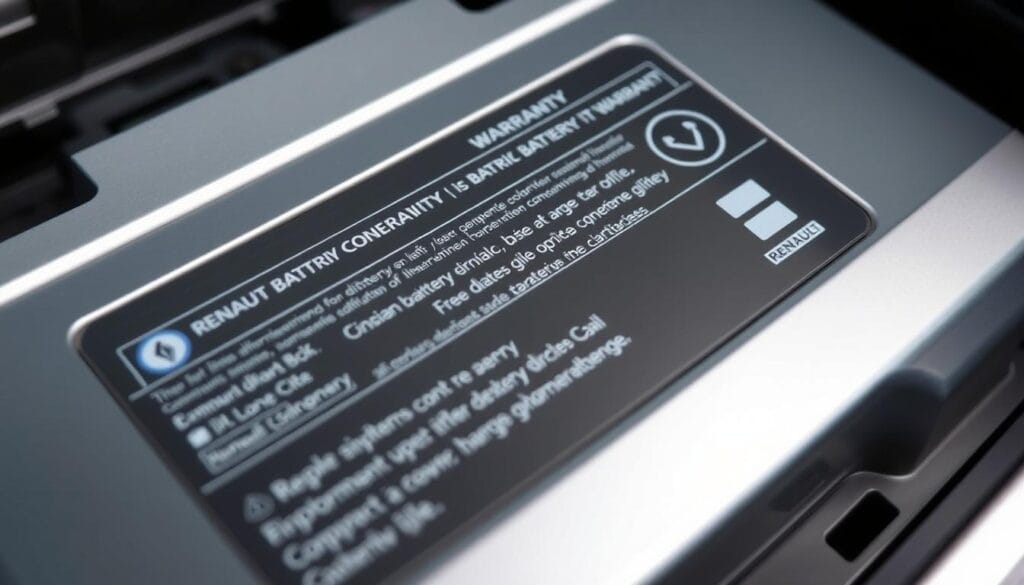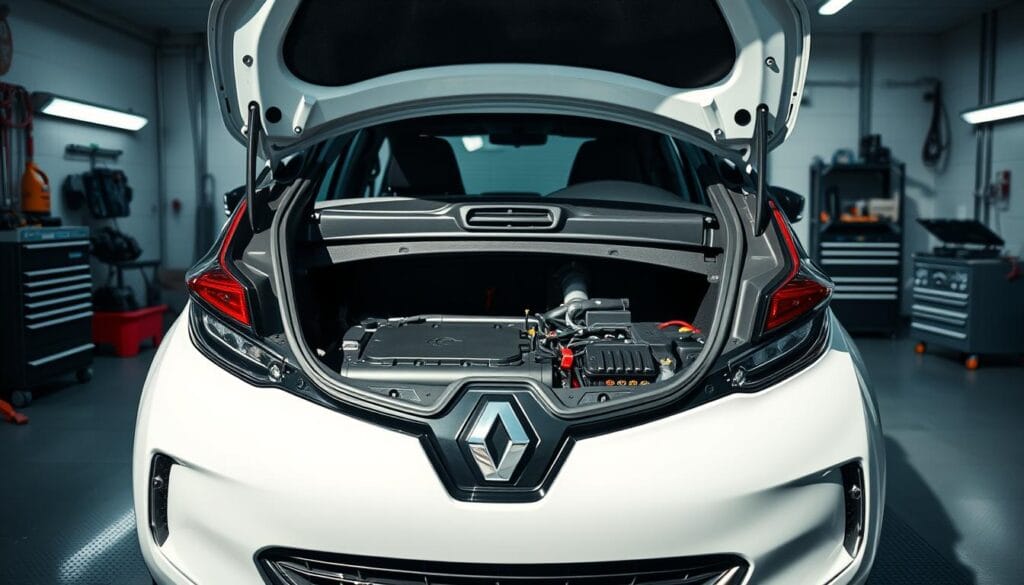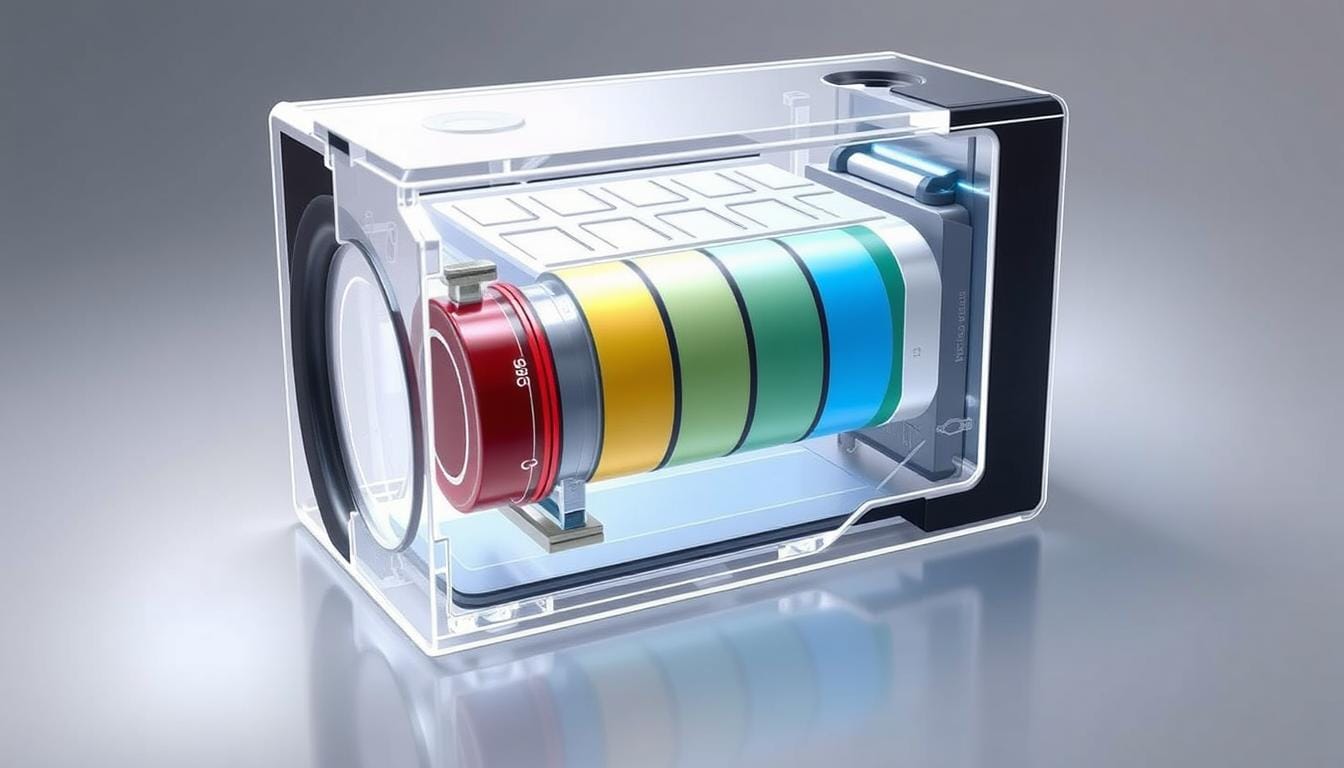Electric vehicles have changed how we travel, and the Renault Zoe leads this change. Since 2013, the Zoe has been a top electric car. It has amazing battery tech that impresses drivers in the U.S.
Knowing about the Renault Zoe’s battery life is key for anyone interested. The battery is a big investment. Learning how to get the most out of your Zoe helps you make smart choices about owning and caring for it.
Starting your electric car journey means learning about battery tech, how it performs, and how long it lasts. The Renault Zoe shows us what the future of green travel looks like.
Key Takeaways
- Renault Zoe pioneered affordable electric vehicle technology
- Battery life is a critical factor in electric vehicle ownership
- Understanding battery performance helps optimize vehicle longevity
- Regular maintenance enhances electric vehicle battery health
- Technology continues to improve electric vehicle battery capabilities
Understanding Renault Zoe Battery Life
Renault EV batteries have changed a lot since the Zoe’s launch in 2013. Knowing about electric vehicle battery tech helps you make smart choices for long-term use and performance.
Battery Technology Evolution Since 2013
The Renault Zoe has led in studying lithium-ion battery wear. Key updates include:
- Enhanced battery chemistry
- Improved thermal management
- Advanced battery cell design
- More efficient energy storage
State of Health (SOH) Explained
State of Health shows how your Renault EV batteries are doing compared to new ones. It’s like a health check for your car’s power source.
| SOH Percentage | Battery Condition | Typical Range Impact |
|---|---|---|
| 90-100% | Excellent | Minimal Performance Reduction |
| 70-89% | Good | Slight Range Decrease |
| 50-69% | Moderate | Noticeable Range Reduction |
Capacity Degradation Factors
Lithium-ion battery wear comes from many things. How long your battery lasts depends on:
- Charging habits
- Temperature exposure
- Driving patterns
- Battery charging speed
- Overall maintenance
Managing these factors well can really help your Renault Zoe’s battery last longer and perform better.
Battery Ownership vs. Leasing Options
Renault changed the game with its unique battery plan for the Renault Zoe. Until January 2021, they offered a battery leasing program. This gave EV buyers more freedom with their Renault Zoe battery life.
- Lower upfront vehicle purchase cost
- Reduced financial risk for battery replacement
- Regular battery health checks included
- Protection against Renault EV warranty concerns
When Renault stopped the battery leasing program, they moved to full ownership. This change meant buyers now buy both the vehicle and battery together. It made buying easier.
For those looking at used Zoes, knowing the battery’s history is key. Cars bought before 2021 might have different warranties than newer ones with full battery ownership.
Tip: Always verify the specific battery ownership status when considering a pre-owned Renault Zoe.
The full ownership model now offers clearer warranty coverage. It also gives owners full control over their vehicle’s battery life.
Renault Zoe Battery Specifications and Capacity
The Renault Zoe electric vehicle is a big step forward in battery technology. Its advanced battery system offers impressive capabilities. This makes it stand out in the electric vehicle market. Knowing about the Zoe battery range helps buyers make smart choices about this innovative electric car.
The latest Zoe model has a powerful 52kWh battery pack. This is a big improvement over earlier models. The new battery configuration boosts the electric vehicle’s performance.
Battery Pack Technical Specifications
- Total battery capacity: 52 kWh
- Energy density: Approximately 180 Wh/kg
- Voltage range: 400V electrical system
- Weight: Approximately 326 kg
Power Output and Performance Characteristics
The Renault Zoe’s battery offers top-notch performance. The 52kWh battery pack generates a lot of power. This means smooth acceleration and consistent energy delivery.
Drivers will enjoy responsive driving dynamics. The battery’s energy management is also efficient.
Innovative Battery Pack Design
Renault engineers placed the battery pack low in the vehicle. This design has several benefits:
- Enhanced vehicle stability
- Improved weight distribution
- Lower center of gravity
- Optimized thermal management
The advanced design ensures safety and performance. It’s perfect for electric vehicle enthusiasts looking for a reliable and efficient ride.
Real-World Range Performance
The Renault Zoe’s battery range is impressive, offering more than what many electric cars can. The Zoe provides a comfortable range for daily driving needs.
Several factors affect how far you can go in an electric car:
- Driving style and speed
- Terrain and road conditions
- Outside temperature
- Use of climate control
Under the best conditions, the Zoe can go 200-245 miles on one charge. Urban drivers will find it very efficient for daily commutes.
Driving in different ways can change how far you can go:
| Driving Condition | Estimated Range |
|---|---|
| City Driving | 240-245 miles |
| Highway Driving | 200-220 miles |
| Mixed Conditions | 220-235 miles |
To get the most out of your Zoe, try driving smoothly and use regenerative braking. These tips can help you go further on each charge and make your battery last longer.
Battery Charging Capabilities and Times
Knowing how to charge your Renault Zoe is key for electric car owners. The Zoe has various charging options for different needs. Whether at home or using public chargers, it offers flexibility and ease.
Home Charging Solutions
Charging your Renault EV batteries at home is simple with several choices:
- Standard 3-pin plug (slow charging): 2.3 kW
- Wall box charger: Up to 7.4 kW
- Three-phase home charger: Up to 22 kW
Fast Charging Specifications
The Zoe is great for quick charging. Your model might have different speeds:
| Charging Type | Power Output | Estimated Charging Time |
|---|---|---|
| AC Charging | 22 kW | 1-2 hours |
| DC Rapid Charging | 50 kW | 30-45 minutes |
Public Charging Infrastructure
Explore public charging networks with confidence. Zoe battery charging works with most public stations, including:
- Nationwide charging networks
- Shopping center charging points
- Workplace charging stations
- Highway service station chargers
Always check your Renault EV batteries’ compatibility. Carry the right charging adapters for smooth charging.
Battery Warranty Coverage and Terms

Knowing about the Renault EV warranty for your Zoe is key for peace of mind. The Renault Zoe battery life has full protection. This keeps your electric vehicle safe.
Renault has a strong warranty for Zoe owners. It covers battery performance well. The warranty terms offer full coverage to keep your car in great shape.
- Warranty Duration: 8 years or 100,000 miles
- Minimum Battery Capacity Guaranteed: 66%
- Coverage Includes: Manufacturing defects and significant capacity loss
The Renault Zoe battery warranty protects against unexpected drops in performance. Your battery is safe as long as you charge and maintain it as recommended.
Protecting your electric vehicle’s heart: The battery warranty is your shield against unexpected performance issues.
| Warranty Aspect | Coverage Details |
|---|---|
| Maximum Coverage Period | 8 years |
| Mileage Limit | 100,000 miles |
| Minimum Capacity Retention | 66% |
The Renault EV warranty doesn’t cover damage from:
- Improper charging practices
- Unauthorized modifications
- Use of non-approved charging equipment
To keep your warranty, regular care and following Renault’s advice are crucial. Keep your Renault Zoe battery safe by charging and storing it right.
Used Renault Zoe Battery Assessment
Buying a used Renault Zoe means checking its battery life carefully. Knowing the battery’s state is key to a good choice and lasting performance.
Looking at a used Renault Zoe? Battery health is a big deal. The battery’s life can change a lot based on how it was used and cared for.
Battery Health Checks
To really know a used Renault Zoe’s battery, follow these steps:
- Ask for a detailed battery health certificate
- Use special tools to check State of Health (SOH)
- Check the battery’s max charge
- Look at the charging history and maintenance records
Pre-Purchase Inspection Tips
Make sure to check the battery well:
- Get a detailed battery report from experts
- Check how much the battery has degraded
- See if the battery still has warranty
- Test how far it can go in real driving
Services like Moba can give you detailed battery certificates. These reports tell you a lot about the battery’s state. They help you choose wisely.
Pro Tip: Always get a professional battery check before buying a used Renault Zoe.
Knowing about Renault Zoe battery life helps you pick a car that works well and costs less to maintain.
Battery Replacement Costs and Procedures
Knowing the cost to replace your Zoe’s battery is key for EV owners. Replacing your car’s battery can be a big deal for long-term use.
Renault EV batteries have different replacement choices based on your model and battery pack. The prices can change a lot:
- New 41 kWh battery pack: About €8,900
- Refurbished 22 kWh battery pack: Around €7,400
- Professional installation: An extra €500-€1,000
Your choice depends on a few important things:
- How old your car is
- The battery’s current health
- If your warranty still covers it
- Your car’s overall condition
Think about whether replacing the battery is worth it. Some people choose partial replacements or certified refurbished units to save money.
Pro tip: Always talk to an authorized Renault service center for exact quotes and a professional check of your battery.
Maximizing Battery Longevity
To make your Renault Zoe’s battery last longer, you need to manage it well. How you charge, store, and use the car matters a lot. The battery’s life depends on these actions and the environment it’s in.

Knowing how to care for your battery is key. It affects your car’s performance and how long it lasts. Good care is more than just charging it right.
Optimal Charging Practices
Here are important tips for charging your Renault Zoe’s battery:
- Keep the battery charge between 20% and 80% for daily use
- Avoid charging it all the way up or letting it go all the way down
- Choose slow charging when you can
- Stick to a regular charging schedule
Temperature Management Strategies
Temperature is very important for your battery’s health. Extreme temperatures can hurt its performance and shorten its life.
| Temperature Range | Battery Impact | Recommended Action |
|---|---|---|
| Below 32°F | Reduced Range | Pre-condition battery before driving |
| Above 95°F | Accelerated Degradation | Park in shaded areas, use climate control |
By following these tips, you can keep your Renault Zoe’s battery in top shape. This might even make it last longer.
Battery Management System Features
The Zoe battery management system is a key innovation in Renault EV batteries. It’s crucial for keeping the electric vehicle’s power source safe and working well. This ensures the car runs smoothly and lasts longer.
Your Renault Zoe’s battery management system does several important things:
- Real-time battery temperature monitoring
- Cell voltage balancing
- State of charge tracking
- Energy consumption analysis
Important parts of the Zoe battery management system include:
| Component | Primary Function |
|---|---|
| Temperature Sensors | Prevent overheating and optimize battery performance |
| Voltage Regulators | Maintain consistent cell performance |
| State of Health (SOH) Tracker | Monitor overall battery condition and remaining capacity |
The Zoe battery management system keeps a close eye on your electric vehicle’s battery. It helps you get the most out of your car’s range and efficiency. It also keeps the battery healthy for a long time.
This system gives you important information about your Renault EV batteries. It helps you make better choices about how you charge and drive your car.
Second-Hand Market Value and Battery Condition
When looking at a used Renault Zoe, the battery’s condition is key. It affects the car’s resale price. This makes battery health important for both sellers and buyers.
Lithium-ion battery wear is a big deal in the used car market. Buyers check the battery’s health before buying.
Resale Value Considerations
The value of your Renault Zoe depends on a few battery-related things:
- Total battery capacity remaining
- Number of charging cycles completed
- Age of the battery pack
- Maintenance history
Battery Certificate Importance
A detailed battery certificate is very valuable when selling a used Renault Zoe. It shows the battery’s performance and health clearly.
| Battery Condition | Estimated Value Impact |
|---|---|
| Excellent (90-100% capacity) | +15-20% of original price |
| Good (80-89% capacity) | +5-10% of original price |
| Average (70-79% capacity) | Near baseline value |
| Poor (Below 70% capacity) | -10-15% of original price |
Pro tip: Regular battery health checks and optimal charging can keep your Renault Zoe’s value high.
Conclusion
Your journey with the Renault Zoe’s electric vehicle battery lifespan is more than just a purchase. It’s an investment in sustainable transportation. Knowing how to care for your Renault Zoe’s battery helps you make smart choices about long-term ownership and maintenance.
The world of electric vehicle batteries is always changing. By using smart charging and keeping an eye on your battery’s health, you can make it last longer. Every time you charge and maintain your Zoe, you’re helping its battery system stay strong.
Renault is always working to make electric vehicle batteries better. Knowing about battery specs, charging, and health checks helps you get the most out of your Zoe. The future of electric cars looks bright, with new tech that will make batteries even better.
If you own a Zoe or are thinking about getting one, knowing about batteries is key. Take charge of the electric revolution with confidence. With the right care and knowledge, your Renault Zoe’s battery will reach its full potential.
FAQ
How long does a Renault Zoe battery typically last?
A Renault Zoe battery lasts about 8-10 years, keeping 70-80% of its original power. Most batteries last 10-15 years or 100,000-150,000 miles before they start to degrade.
What factors affect the Renault Zoe battery’s lifespan?
Several things affect the battery’s life. These include how you charge it, the temperature, your driving habits, and the battery management. To make it last longer, avoid fast charging often, keep the charge between 20-80%, and protect it from extreme temperatures.
Can I replace the battery in my Renault Zoe?
Yes, you can replace the battery. The cost depends on the battery type and model, usually between $5,000 to $10,000. Renault offers replacement options, and some third-party services can also replace or refurbish the battery.
What is the current battery capacity of the Renault Zoe?
The latest Renault Zoe has a 52 kWh battery pack. It offers a range of about 245-260 miles under perfect conditions. However, real-world range can vary based on driving conditions, weather, and how you drive.
How long does it take to charge a Renault Zoe?
Charging times depend on the source: – Home wallbox (7.4 kW): 8-9 hours for a full charge – Public AC charger (22 kW): 3 hours – DC fast charging (50 kW): 1 hour to reach 80% capacity
What warranty coverage does the Zoe battery have?
Renault offers an 8-year or 100,000-mile battery warranty. It ensures the battery keeps at least 70% of its original capacity. The warranty covers manufacturing defects and significant capacity loss.
How can I check the health of a used Renault Zoe’s battery?
Use diagnostic tools or professional services to check the battery health. Look for a battery health certificate and check the State of Health (SOH) percentage. A professional inspection can also assess the battery’s condition before buying a used Zoe.
What are the best practices for maintaining Zoe battery life?
To keep the battery in good shape, avoid frequent fast charging. Keep the charge between 20-80%. Park in moderate temperatures and use regular, consistent charging. Avoid letting the battery completely drain and follow the manufacturer’s maintenance advice.
Does battery condition affect the Zoe’s resale value?
Yes, battery health greatly affects resale value. A well-maintained battery with high State of Health can keep the vehicle’s value high. Buyers usually look for batteries with over 70% of original capacity when buying a used electric vehicle.
What is the Battery Management System (BMS) in the Renault Zoe?
The BMS is an advanced system that monitors and manages the battery. It checks battery health, controls charging and discharging, regulates temperature, and balances cells. It helps optimize performance, protect against damage, and extend battery life.





